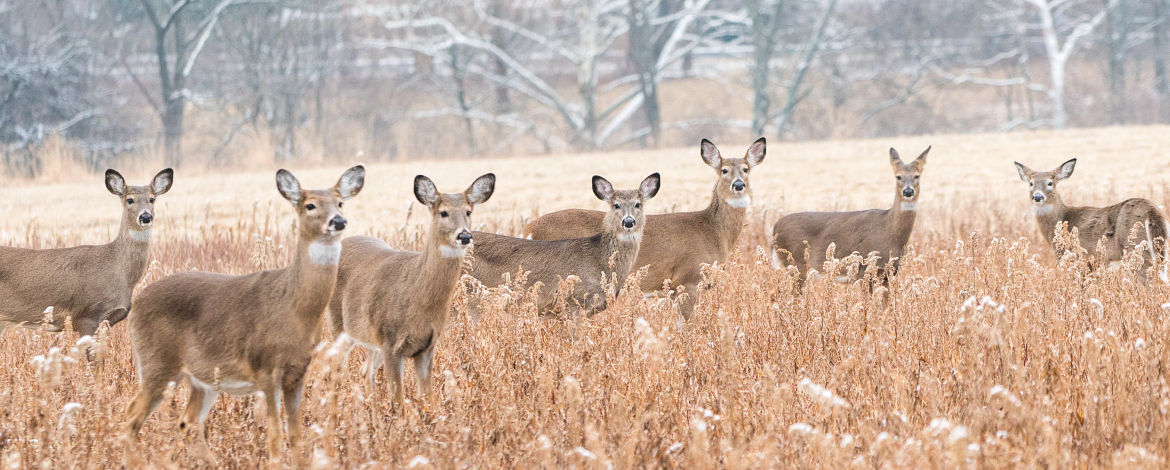Wisconsin's Deer Donation Program

Deer Donation Program
Hunters can help Wisconsinites in need by donating deer harvested in Wisconsin through the DNR's deer donation program.
Venison from donated deer is processed and distributed to food pantries across the state. Since the program began in 2000, hunters have donated over 94,000 deer, which were processed into over 3.8 million pounds of ground venison.
Wisconsin has a network of venison donation partners, including county land and water conservation departments, food pantries, charitable organizations, Hunt for the Hungry, USDA - Wildlife Services and participating processors, who help implement and administer the program.
HOW TO DONATE YOUR WISCONSIN DEER
Hunters can donate any deer harvested legally in Wisconsin. Deer harvested outside Wisconsin cannot be donated. Deer harvested in a listed county affected by chronic wasting disease (CWD) must be tested for CWD before or at the time of donation (see below).
- Field dress your deer. Please handle the carcass as if it were destined for your table. A couple of bags of ice placed in the cavity will help preserve the carcass in warm weather.
- Register your deer. Make a note of your registration confirmation number, which you'll need later. If your deer was harvested from one of the CWD-affected counties, please ensure you completed the required CWD testing before donating.
- Call ahead! Contact one of the participating processors before dropping off your deer to ensure they have space to accept it. More processors may be added later in the season, so check back if you don't see one currently in your area.
- Drop off your deer at a participating processor.
WHAT TO EXPECT WHEN DROPPING OFF YOUR DEER
Hunters can donate the entire deer free of charge and retain the head and antlers for mounting if desired.
When dropping your deer off at a processor, you will be asked to complete the log sheet indicating your desire to donate the deer. We'll do the rest. The donated deer will be processed, and the venison will be distributed to charitable organizations to help feed Wisconsin's needy.
CHRONIC WASTING DISEASE-AFFECTED COUNTIES
Deer harvested in any of the CWD-affected counties listed below must be tested for CWD either before or at the time of donation. The processor will hold the processed venison until the results are known.
- All adult deer harvested in Buffalo, Dunn, Eau Claire, Fond Du Lac, Green Lake, Jackson, Kenosha, Langlade, Lincoln, Marathon, Marquette, Milwaukee, Monroe, Oconto, Oneida, Pierce, Polk, Portage, Shawano, Sheboygan, Trempealeau, Vilas, Washington, Waupaca Waushara, Winnebago, and Wood.
- All adult and fawn deer harvested in Adams, Columbia, Crawford, Dane, Dodge, Grant, Green, Iowa, Jefferson, Juneau, Lafayette, Racine, Richland, Rock, Sauk, Vernon, Walworth, and Waukesha.
DEER DONATION PARTNERS PROGRAM
The DNR is partnering with individuals and organizations to provide convenient deer donation drop-off locations through the Deer Donation Partners Program during the Gun Deer Season. In interested communities, volunteers will host a deer donation drop-off site so hunters can donate their legally harvested deer to help feed those in need but where there are no locally participating processors. Partners will donate the cost of a refrigerated trailer to collect and transport donated deer to neighboring participating processors. Drop-off locations will be listed on the Deer Donation Program's participating processor list. Check out the list under "How to Donate Your Wisconsin Deer" to see if any deer drop-off sites are listed in your county. Contact Marcus Rufledt, Wildlife Program Specialist, for more information on this new program.
MAKE A FINANCIAL DONATION TO THE DEER DONATION PROGRAM
Hunters and the public can voluntarily donate $1 or more to the Deer Donation Program to help cover meat processing fees. You can donate at any Wisconsin Hunting License sales location or online through your Go Wild account.
NON-TOXIC AMMUNITION
Tests on processed venison suggest there may be lead levels of concern in meat from deer harvested with lead ammunition. Consider switching to alternative expanding non-lead ammunition, such as copper, or other high-retention bullets, to reduce exposure to lead for venison recipients. Visit the safely eating venison page for recommendations on reducing the risk of lead in venison.
